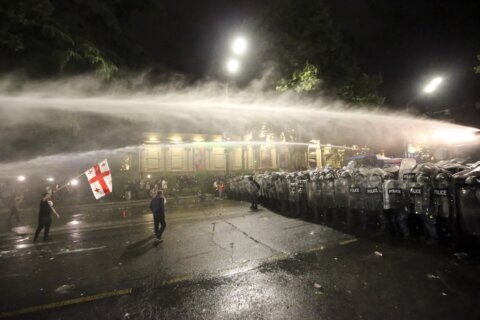DUBAI, United Arab Emirates (AP) — Iran’s official news agency said Monday that the gunman who killed 13 people at a major Shiite shrine last month was a citizen of Tajikistan.
The militant Islamic State group has claimed responsibility for the Oct. 26 attack on Shah Cheragh in the city of Shiraz, one of Iran’s top five Shiite shrines. But the government has tried to blame the attack on the largely peaceful anti-government protests, without offering evidence.
Iran initially said 15 were killed in Shiraz but later revised the number to 13 over double-counting.
The report on IRNA identified the gunman as Sobhan Komrouni. He died in a hospital in southern Iran, days after the Oct. 26 attack, from injuries sustained during his arrest.
Citing Iran’s Intelligence Ministry, Monday’s report said the gunman’s accomplice was an Afghan citizen, Mohammad Ramez Rashidi. A third suspect, from neighboring Azerbaijan, was allegedly the “main coordinator” of the attack from Iran’s capital, Tehran, the report said.
IRNA said authorities have arrested 26 suspects — purportedly with links to extremist groups — over the shrine attack, all reportedly nationals of Azerbaijan, Tajikistan and Afghanistan.
It said, without elaborating, that some of the suspects were planning a similar attack in the city of Zahedan in the restive southeastern province of Sistan and Baluchestan, the scene of the deadliest unrest since the protests began.
Iran is embroiled in weeks of anti-government protests that erupted after a 22-year-old Kurdish woman, detained after allegedly violating the country’s strict dress code for women, died in custody in September.
On Monday, authorities restricted access to Iran’s beach soccer team when it returned to the country after defeating Brazil at the International Beach Soccer Cup in Dubai on Sunday.
One of the players had celebrated after scoring a goal by mimicking a female protester cutting off her hair, a gesture that appeared to express support for the demonstrations.
Iran’s football federation threatened to punish players who had “disrespected professional and sports ethics,” citing a ban on on-field political demonstrations, without elaborating.
Last month, Iranian rock climber Elnaz Rekabi competed in South Korea without wearing Iran’s mandatory Islamic headscarf, known as the hijab, a move that was widely interpreted as expressing support for the protests. A huge crowd of supporters gave her a hero’s welcome at the airport.
In an interview with state television upon her return to Iran she said the act was “unintentional,” but it was unclear if she spoke under duress.
The BBC’s Persian service, which has extensive contacts within Iran despite being banned from operating there, reported that Iranian officials had seized both Rekabi’s mobile phone and passport, and that her flight had been moved up unexpectedly. The Iranian Embassy in Seoul denied what it said was “false news and disinformation” regarding Rekabi’s departure.
The International Olympic Committee said it received assurances from Iranian officials that she would not suffer any consequences.
Copyright © 2024 The Associated Press. All rights reserved. This material may not be published, broadcast, written or redistributed.







